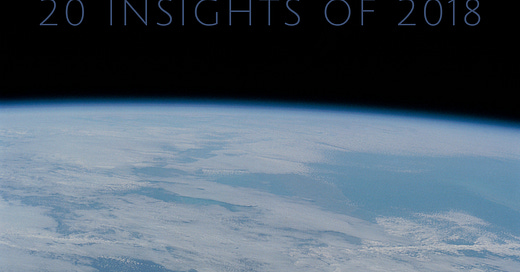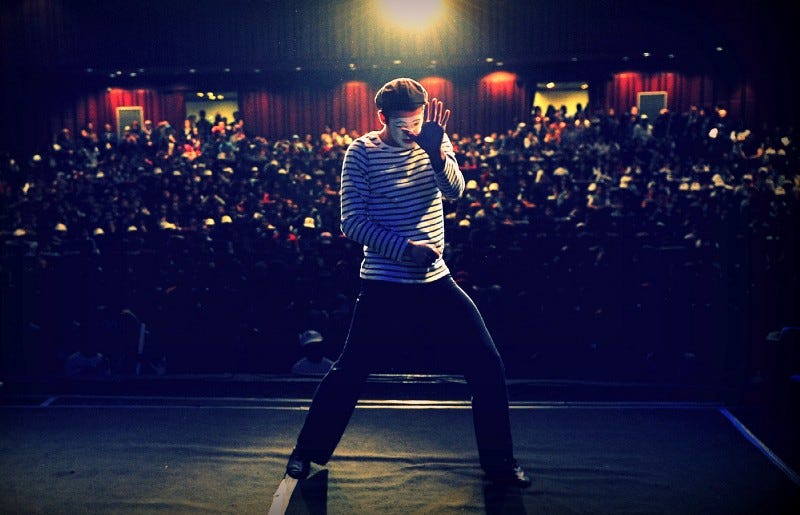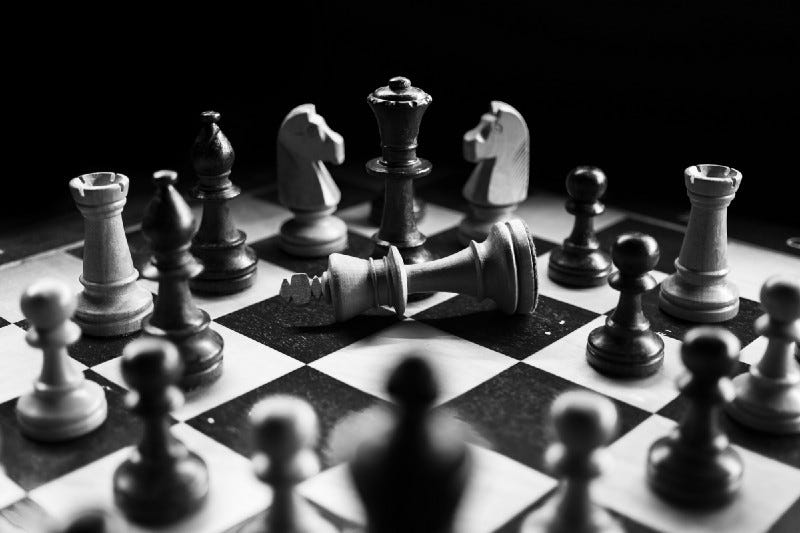20 INSIGHTS OF 2018
Do you know this feeling of hearing or reading something that really resonates with you and then feeling like you have gained new insights…
Do you know this feeling of hearing or reading something that really resonates with you and then feeling like you have gained new insights into life? Or when you experience something and it just changes how you look at things?
Like when you’re listening to a podcast, when you’re reading a book, when you’re deeply engaged in a meaningful conversation, or when you’re simply stumbling upon a powerful quote on Instagram… Well, I bet you usually forget about what you heard or read within a few days, hours or even minutes. :)
I’m sure you know what I’m talking about… Well, I’m pretty much the same.
Except for that, whenever I care enough to pull out my phone or notebook, I write these kinds of insights down. Hundreds of them within a year.
I also think hard about the experiences I make (sometimes at least) — especially when they’re intense. And sometimes, these experiences lead to actual insights and learnings.
I care enough to share them.
In 2018, I went through a lot of ups and downs. I left my job at the end of 2017 to have some time for traveling and working on my own ideas in 2018. Which I did. But there was also a lot of other stuff going on. Falling in love. Deeply opening up to someone special. Having my heart broken. Healing. Lots of healing. Overcoming. Accepting. Learning. Ayahuasca. Falling in love with Peru. Learning Spanish. And a lot more.
So here’s a random collection of thoughts, ideas, and learnings that I found to be very profound in 2018. Some of them are my own humble creation, based on my experiences this year. Some of them come from somewhere and someone else.
If you like this, feel free to share it!
1) A lot of the things we think we need in life are in fact 100% optional.
Think about it. You know it’s true. Except for water, food and physical safety, there isn’t much we REALLY NEED. We WANT all the things we think we need. And some of them even feel good (although many are just the devil in another form).
But at any point in time, there are people in this world who are living perfectly well without that thing that you and I so “desperately need.”
2) Don’t pursue that which has a chance to work but that which matters.
Which is better: trying something that’s really important for you and maybe failing at it, or succeeding at something you don’t really give a shit about?
We can find meaning in things that don’t work. Just in the pursuit of them.
Intentions matter.
Also, our definition of “working” or “succeeding” is often not tied to good life outcomes (which we are all after eventually).
Don’t ask if you win or lose the game. Ask if playing the game actually matters.
3) The weight of regret is much heavier than the weight of failure.
Silently asking yourself “what if…?” after the door has closed can be cruel.
This year I went through an intense breakup. One I didn’t want. I made mistakes — like everyone always does when going through intense emotional shit.
But here’s one mistake I did NOT make: I did not give up too soon. I put myself out there. I mustered up all of my courage to fight. I literally put in all of the energy I had in me.
Well, obviously I failed.
However, today, I know that it was for the best. I’m over it. I’m happy. I let go.
Yes, I failed. But asking myself right now “what if I had fought and tried a bit harder…?” would be ten times worse. And it’s exactly because I don’t have to ask myself that, that I now feel good about it.
4) “The secret of change is to focus all of your energy, not on fighting the old but on building the new.” — Socrates
We can either focus on “fixing what is wrong” or on “creating what is good.” It’s a subtle but powerful difference.
5) Change comes from lifting your standards, not your dreams.
You’re not the highest version of yourself you can imagine, you’re the lowest version of yourself you can accept.
We can imagine the greatest version of ourselves all we want — but if we don’t let that spark action, what does it do? Not much.
It’s usually only when we aren’t willing to accept the perceived negatives in our lives anymore, or at least aren’t willing to see them preventing us from living our best life, that we really improve ourselves. Let’s just raise the bar for what we are willing to accept in ourselves — without beating us up of course.
6) Life is never a performance. It’s always practice.
The world is not our stage, although it sounds smart in memes with inspirational sunset pictures. We are not here to present ourselves and play a script. The world is rather our wide-open practice field.
We are here to experience, to strive, to try, to fail, to learn, to try again, to share, to care, to help, to wonder, to ask, to listen, to smile, to cry, to engage, to encourage, to connect, and to love.
None of this is about competition. Not with ourselves or anyone else. Maybe life is a game — or a series of games (see number 12). But there is no final enemy. It just goes on.
We’re not playing AGAINST anyone. We’re playing WITH them. And we’ll make mistakes along the way, over and over again. But that’s okay. We’ll just keep practicing.
7) Love is not just a sensation. It’s the result of continuous effort.
I’ve written about this extensively in a previous article that went viral (at least for my standards).
It seems to me that it is easy to enjoy the seemingly effortless phase of “being madly in love”, while it is much harder to give love space, as well as the time and the exploratory freedom to make mistakes needed so it can grow and deepen. It is only when we are required (and ready!) to leave our comfort zones — emotionally, mentally, intellectually, and spiritually — that love and relationships can truly grow. I think that we all intuitively understand that, but we very quickly become blind to that fact once we’re coming closer to the edge of our own comfort zone. And then, we cringe and back off.
Scott Peck writes in his fabulous book “The Road Less Traveled” that love is the extension of the ego of oneself. An extension into uncharted territory that can only happen if you muster up discipline and courage.
This is an insight I painfully gained this year myself through experience. But I’m glad I did. It changed SO MUCH about how I view love and relationships.
Again, read this for a much deeper insight into this topic.
8) We are not who we say we are, we are not who we want to be. What we truly are is the sum of the influences and impacts we have in our lives on others.
If you don’t think you’re an asshole. And if you really don’t want to be an asshole. But if you behave towards everyone like an asshole — what are you?
It’s only through our impact on other people that our true nature manifests itself.
9) If you want something in your life, you have to become capable of taking it. That’s what education is about.
That’s an interesting take, isn’t it? Whether it’s learning about how the world and its systems work, about your Self, or about the dynamics between people. And it makes continuous self-education on all levels (intellectually, emotionally, socially, spiritually, physically, …) so much more tangible.
10) The quality of our minds determines the quality of our lives.
Every thought or feeling — good or bad — has once arisen in your mind, and then passed away. The anger you felt yesterday or last year has passed away. And even if it comes back because you’re thinking about it now, it will pass as soon as you’re not thinking about it anymore.
Your ability to think good thoughts and to handle negative ones largely determines how you feel. Your mind determines how you experience your life. You better train it.
11) You can’t control your subconscious.
But you can work on two things:
Learn to make the subconscious more conscious (awareness/mindfulness).
Create the right environments that will influence your subconscious in a positive way.
12) Life’s not like a game, it’s like a series of championships, which are a series of games.
The goal is not to win one game, but to play such that you’re invited to play ever more games and can win the championship. Sometimes, you have to sacrifice one game in order to win long-term (i.e. building character rather than winning cheaply, so you can iterate on that and win more games in the future).
I think this metaphor is very powerful because it shows you that you are really not in it for the short-term gains. It’s not about maximizing every single opportunity that comes your way. It’s about building yourself as a human so that you get to maximize the experience of living your life as a whole.
Sometimes losing is part of that. Sacrifices are part of that. Retreating and learning is part of that. Being a good sportsman is part of that.
13) There is no clear objective boundary between family and the rest of the species.
Think about it. When does your family end? How much genetic similarity is needed for someone to be called “family”? It’s arbitrary.
How close we feel to someone depends on circumstance and perspective. Isn’t that beautiful?
14) We all are searching for alibis.
“There is a powerful craving in most of us to see ourselves as instruments in the hands of others and thus free ourselves from the responsibility for acts that are prompted by our own questionable inclinations and impulses. Both the strong and the weak grasp at the alibi. The latter hide their malevolence under the virtue of obedience; they acted dishonorably because they had to obey orders. The strong, too, claim absolution by proclaiming themselves the chosen instrument of a higher power — God, history, fate, nation, or humanity.”
— Bruce Lee
Liberate yourself by claiming responsibility for everything in your life.
15) Personal development is chaotic.
In two ways:
It is non-linear. There can be enormous jumps, phases of stagnation, or even setbacks. We don’t go from level 1 to 2 to 3 … Sometimes we go from 1 to 9, back to 5, then we oscillate between 3 and 6 for a while, before we suddenly explode to 25.
Your own understanding of what constitutes personal growth can change drastically — without you realizing it at the time.
In 2018, I’ve had a long phase of self-doubt and confusion. I didn’t really feel any progress in the areas I was used to looking at in my life (physical fitness, intellectual knowledge, self-management, leading others). It is only now, in hindsight, that I realize that these areas have just become less important to me and that my real personal growth took place somewhere else: self-knowledge and vulnerability.
At the time, I didn’t realize these were the areas I had to evolve in. Neither did I notice that I was actually in the process of doing exactly that.
16) “A great achievement is just what a long series of unremarkable tasks looks like from far away.” — Tim Urban
Tim Urban wrote this amazing article on how we live in a pixel instead of a picture. And it made me understand (even more than before) how my life is the net result of all the ordinary, recurring, sometimes even boring choices I face on a daily basis.
Yes, sometimes I can zoom out and look at my life from above, viewing it as a beautiful and complex picture. That’s our uniquely human ability of self-reflection.
But the day-to-day experience of how it is to live my life is much more determined by all of the tiny little aspects (pixels) that I don’t even get to see when zooming out. But in total, they make the picture.
“Happiness doesn’t function in sweeping strokes, because we don’t live in broad summations — we’re stuck in the tiny unglamorous folds of the fabric of life, and that’s where our happiness is determined.”
— Tim Urban
It’s the small things that matter after all.
17) Don’t make permanent decisions based on temporary feelings.
We are driven by emotion. That’s nothing new. And it’s nothing bad. It’s just part of being human. And emotions can be beautiful. But they can also misguide us.
We like to tell ourselves the idealistic story of that “we need to trust our feelings” more. Well, often that might be true. But sometimes it can also be dangerous. Because our feelings and emotions have not evolved to make us permanently happy.
Maybe that sounds unromantic, but it doesn’t make it less true. I’m sure you have taken suboptimal decisions as a result of temporary feelings before, haven’t you?
18) “The walls of self-preservation are also the walls of self-imprisonment.” — Sadghuru
It’s natural for us to protect our identity. To protect our sense of self. Because there’s almost nothing more awkward and mentally painful than doubting our own identity; than doubting the things we are defining ourselves with (our beliefs, our habits, our opinions, our inner truths).
But if we never expose ourselves to opposing forces, we will get no impulses for development in different directions. We will just stay within the existing boundaries of our mental and emotional bubble that feels so comforting. We will just further strengthen our pre-existing biases, our distorted views, and our delusional beliefs.
And, at any point in time, it is very very very likely that you, just like me or anyone else, carry at least a few of these inside you without realizing it.
So if we are only focused on preserving our sense of self as it is, we will imprison ourselves and damn ourselves to run circles around our own ignorance.
19) Life is a never-ending sequence of dice rolls.
Each decision can be seen as a single roll of the dice. And usually, that is all we see.
We don’t think about the fact that life is basically a never-ending sequence of dice rolls. And a strategy that loses a lot per roll can actually make you a big winner in the long run. You will lose more than you will win. But one win will far outstrip all of your losses.
If you only think in terms of the immediate results, you cut yourself off from the biggest potential wins in life.
Here are a few examples of how you can leverage this:
Be excessively bold in dating life, exactly stating what you want. This will most likely turn most potential partners away. But the ones who stay might be the best for you.
Read difficult books knowing you’ll probably not like most of them. But one could change your life.
Say yes to every invitation knowing that most will be boring. But one could lead to the encounter of your life.
I got this idea from a blog post of one of my favorite writers, Mark Manson. Thanks Mark!
20) You are the solution.
Life can suck. Shit happens. That’s undeniable. Sometimes it’s you who’s the problem. Sometimes it’s someone else. Sometimes it’s both of you. Sometimes it’s circumstances. Or whatever.
But YOU are always the solution — to all of it. Because it is always you who can initiate change. It’s you who can learn to accept. It’s you who can educate yourself to make things better. And it’s you who can change perspective. It’s always you.
If you see yourself as the solution to all of your challenges and problems in life, you will experience an extraordinary amount of agency and autonomy.
And you will be able to shape your life much more like you really want it.
THE END.
Thank you for reading this! I honestly appreciate it.
If you like this post, please leave a clap (or 50!) and feel free to share it. :)
If there’s anything going on in your mind right now, liberate yourself and write it down in the comment section! I will happily reply. :)
Much love,
Philipp













